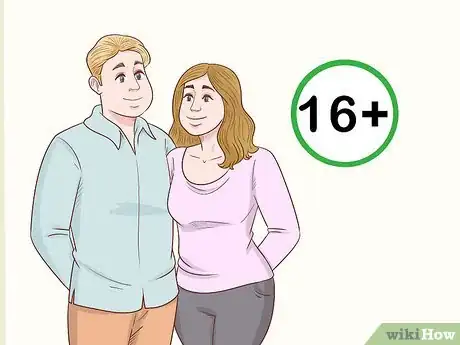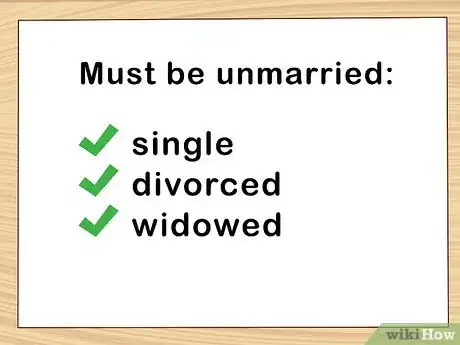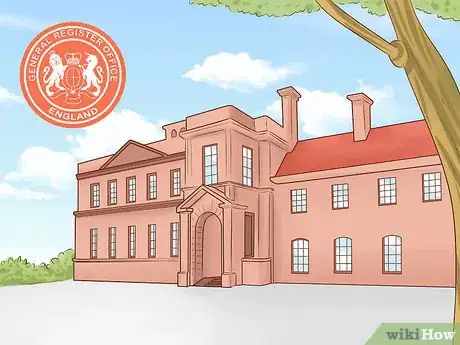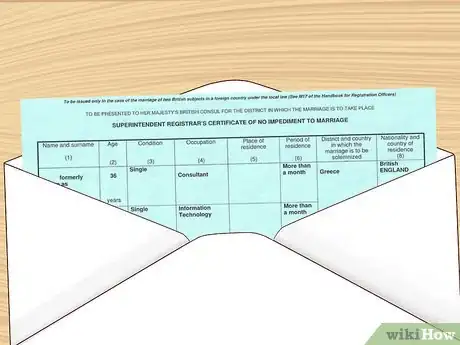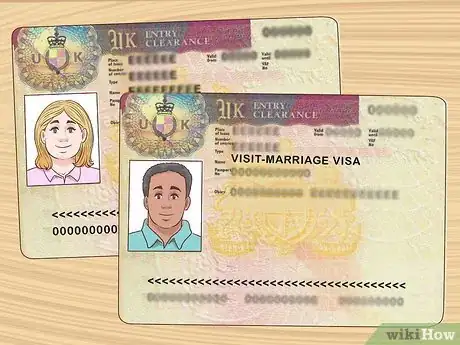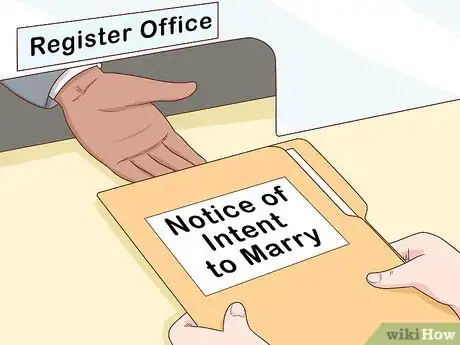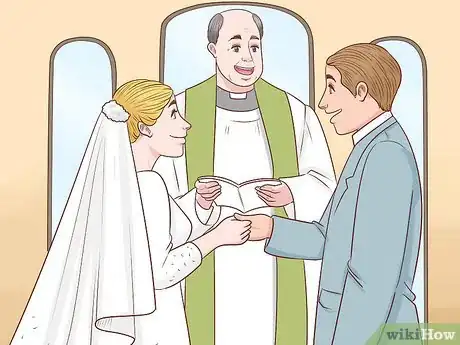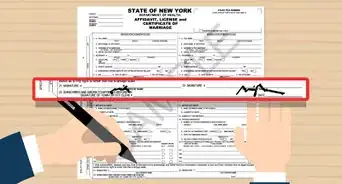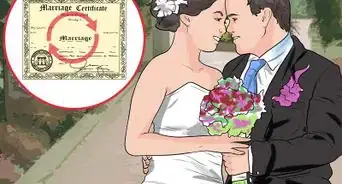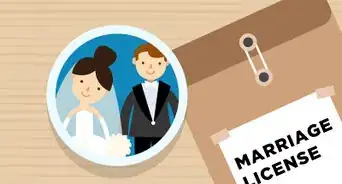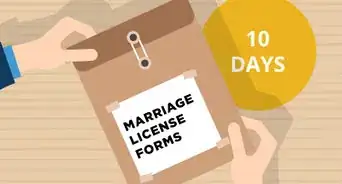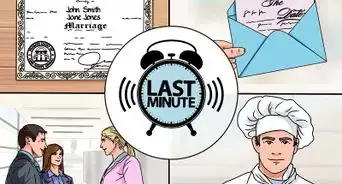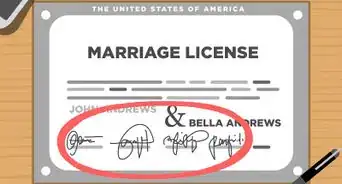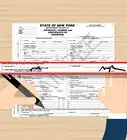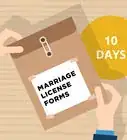This article was co-authored by Clinton M. Sandvick, JD, PhD. Clinton M. Sandvick worked as a civil litigator in California for over 7 years. He received his JD from the University of Wisconsin-Madison in 1998 and his PhD in American History from the University of Oregon in 2013.
There are 15 references cited in this article, which can be found at the bottom of the page.
This article has been viewed 70,811 times.
Whether you dream of a fairy tale wedding in a medieval castle or quirky Dr. Who themed nuptials, couples who want to get married in England need to pay attention to details and legal requirements. Considerations including documentation, residency, budget, and venue require advance planning.
Steps
Planning your Wedding
-
1Meet the age requirement. You and your partner must both be at least 16 years of age when you give notice at the Register Office in the area of England where you want to get married. You must be able to produce a birth certificate or other proof of age if asked.[1]
- Couples between the ages of 16 and 18 who are from England, Wales, and Northern Ireland will need written permission from parents or guardians.
- Foreign nationals under the age of 18 are not allowed to get married in England, even with parental consent.
-
2Confirm your eligibility to marry in England. You must be unmarried and free to contract. You can be single, divorced, or widowed. However, you must be able to produce your divorce documents or a death certificate for your deceased spouse.[2]
- Same-sex couples may marry in England through a civil ceremony or a religious ceremony performed by a willing church. The Church of England currently will not administer the marriage sacrament to same sex couples.[3]
- Transgender individuals can marry as their chosen gender only if they have a birth certificate showing that gender.
Advertisement -
3Select a wedding venue. There are strict regulations regarding wedding locations in England. Your venue must be approved by the Register Office governing the area where you wish to wed. The owner of the venue must seek to be a "local authority approved premise." Generally, wedding venues must be open to the public, have permanent structures, and be considered "stately." Private residences and open air venues are unlikely to be approved without extraordinary circumstances. Unless you want all your wedding and travel planning to end up with a perfunctory ceremony in the Register Office, vet and reserve your venue well in advance.[4]
Marrying in England
-
1Determine your wedding notice requirements. There are four categories of couples that England recognizes and each has slightly different requirements for notice, licenses, visas, venues, and fees.
- If both parties are residents of England, Wales, or Northern Ireland, you will give notice at your local register office. That notice will be posted for a minimum of 28 days and include information about the date, time, and place of your wedding.[5]
- If citizens of Scotland wish to marry in England, they must abide by notice requirements and provide a Scottish registrar’s "certificate of no impediment," proving there is no legal reason you cannot be married.
- If one person is already living in the UK as a citizen or a legal resident and you are a foreign national, you have to apply for a visa dependent on your future plans. If you intend to live in the UK for at least six months after the wedding, you will need a "family of a settled person" visa.[6] If you will be living in England for less than six months, you can get a "visitor visa."[7]
- If you are marrying a UK citizen and are otherwise qualified for British citizenship, you cannot apply for a visa. You must apply for citizenship.[8]
- If both parties are from the European Economic Area, (EEA)[9] you may be able to apply for an EEA Family Permit.[10]
-
2Apply for a foreign national marriage visa. If you and your partner are both foreign nationals who do not live in the European Economic Area (EEA),[11] commonly known as the European Union, also including Switzerland, Iceland, Liechtenstein, and Norway, you must apply for a Marriage Visitor visa.[12]
- A marriage visa is good for six months and you may be asked to provide proof of financial solvency, including where you will be staying during your visit, and how you plan to return home.[13]
- You will need to show a valid passport from your country of citizenship.
- You must apply for your marriage visa online.[14] In the United States, you will then report to a U.S. Department of Homeland Security application support center for your photo and fingerprints. After completion, you have two weeks to postmark your application package to the visa department of the British Consulate General in New York. You must include return postage.[15]
-
3Give notice at the Register Office. Once you have the appropriate visa and you've been in England for at least seven full calendar days, you and your partner can give notice of your intent to marry at the Register Office governing the area when you want to get married.[16] You must give notice, in person, at least 28 days before your planned wedding day.[17] The fee to give notice for non-citizens is approximately $75.
-
4Marry in a civil ceremony. British law defines a civil marriage as an exchange of formal words. You can write your own ceremony or use standardized vows.
- A civil ceremony and exchange of vows cannot include any religious text, hymns, or readings from the Bible.
- You must have at least two witnesses to the ceremony. You, your partner, and your witnesses will sign the marriage register.
-
5Marry in an English church. If you have fulfilled the visa and notice requirements, you are free to seek approval to marry in any church in the area governed by the Register Office. The church is free to grant or deny your application. No church can be compelled to perform a wedding that does not conform to its internal rules.
- Call your banns. If you are marrying a citizen or resident, the church will require a traditional reading of banns. Banns are a notice that is read in church at least three Sundays during the three months before your wedding. Your banns must be called in the parish church of each party (if applicable) and in the church where you want to be married.
- Church of England marriages between foreign nationals requires a Common License that replaces the reading of banns in the church where you intend to marry. Contact the local vicar for the procedure. The fee for a Common License is approximately $300.
- You may also require a Superintendent Registrar's Certificate. After you have been in the district where you intend to marry for at least seven full calendar days, you can apply for this certificate.
- Your church wedding must occur between 8 a.m. and 6 p.m. on the selected day.
- If you are previously divorced, you need to discuss it with the vicar of the church. Even if you have your visa and licenses in place, the church is not obligated to host your wedding.
- The fee to register your marriage and receive a marriage certificate will be approximately $100.
References
- ↑ https://www.gov.uk/marriages-civil-partnerships/overview
- ↑ https://www.gov.uk/marriages-civil-partnerships/documents-to-take-to-the-register-office
- ↑ https://www.gov.uk/marriages-civil-partnerships/overview
- ↑ https://www.gov.uk/government/publications/civil-marriages-and-partnerships-approved-premises-list
- ↑ https://www.gov.uk/marriages-civil-partnerships/giving-notice-at-your-local-register-office
- ↑ https://www.gov.uk/join-family-in-uk
- ↑ https://www.gov.uk/marriage-visa
- ↑ https://www.gov.uk/becoming-a-british-citizen/how-to-apply
- ↑ https://www.gov.uk/eu-eea
- ↑ https://www.gov.uk/family-permit
- ↑ https://www.gov.uk/eu-eea
- ↑ https://www.gov.uk/marriage-visa/eligibility
- ↑ https://www.gov.uk/marriage-visa/documents-you-must-provide
- ↑ https://www.visa4uk.fco.gov.uk/home/welcome
- ↑ https://www.gov.uk/government/publications/usa-apply-for-a-uk-visa/apply-for-a-uk-visa-in-the-usa
- ↑ https://www.gov.uk/government/publications/designated-register-offices-in-england-and-wales
- ↑ https://www.gov.uk/marriages-civil-partnerships/foreign-national
About This Article
To get a marriage license in England, you’ll need to be 18, or 16 with your parents’ permission. You can marry through a civil ceremony or a religious ceremony performed by a willing church. Either way, you’ll need to give at least 28 days’ notice at the register office before your wedding date. You’ll also need 2 witnesses at your wedding to sign your marriage register. If you and your partner are both foreign nationals and don't live in the European Union, you'll need to apply for a Marriage Visitor visa on the UK government website. For more tips from our Legal co-author, including how to marry a foreign national as a UK citizen, read on!
